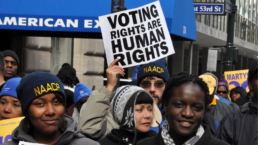While many states have made it easier for people convicted of felonies to vote, Tennessee has gone in the other direction.
by Bianca Fortis, ProPublica
Leola Scott recently decided to become a more active citizen. The 55-year-old resident of Dyersburg, Tennessee, was driven to action after her son was stabbed to death and nobody was charged.
In August, Scott tried to register to vote. That’s when she learned she’s not allowed to cast a ballot because she was convicted of nonviolent felonies nearly 20 years ago.
One in five Black Tennesseans are like Scott: barred from voting because of a prior felony conviction. Indeed, Tennessee appears to disenfranchise a far higher proportion of its Black residents — 21% — than any other state.

The figure comes from a new analysis by the nonprofit advocacy group The Sentencing Project, which found that Mississippi ranks a distant second, just under 16% of its Black voting-eligible population. Tennessee also has the highest rate of disenfranchisement among its Latino community — just over 8%.
While states around the country have moved toward giving people convicted of felonies a chance to vote again, Tennessee has gone in the other direction. Over the past two decades, the state has made it more difficult for residents to get their right to vote back. In particular, lawmakers have added requirements that residents first pay any court costs and restitution and that they be current on child support.
Recent Posts
Stop Israel’s Dystopian “Humanitarian City” Plan—Before It’s Too Late
July 11, 2025
Take Action Now For the past 20 months, the world has watched—and largely enabled—a genocidal campaign in Gaza. Over 55,000 Palestinians have been…
The “Liberal” International Order Is Criminalizing Palestine Protests
July 11, 2025
Take Action Now As Western governments repress Palestine solidarity and enable Israel’s impunity, the “liberal international order” is no longer…
Politicians Are Betraying Gen Z On Climate
July 10, 2025
Take Action Now While Gen-Zers thrift, knit, crochet, and find other ways to reduce our footprints, Trump and the GOP are greenlighting more climate…
Trump’s Deportation Threat Against Zohran Mamdani Is Shameful
July 10, 2025
Take Action Now In only half a year of Donald Trump’s presidency, he and his allies have turned deportation into an explicitly political threat…




